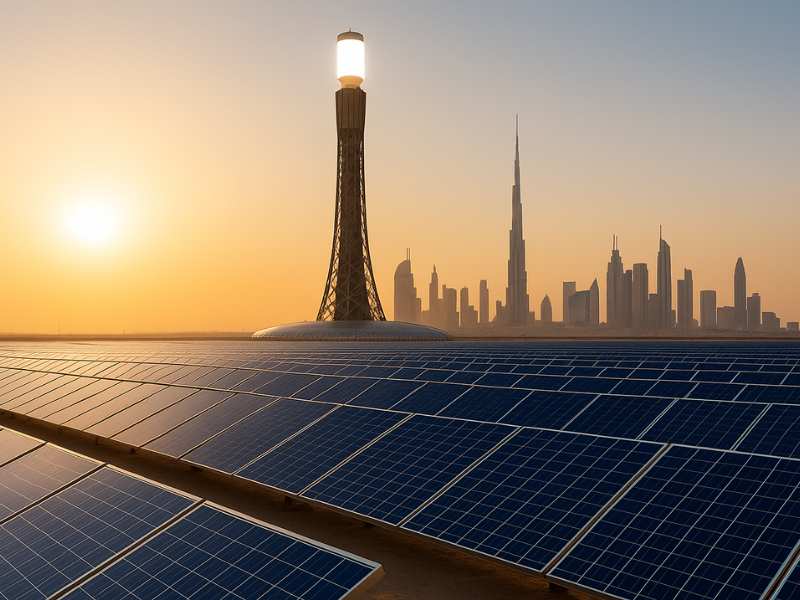Dubai has announced a comprehensive roadmap to achieve Dubai Clean Energy 2050, reinforcing its position as a global leader in sustainability and renewable energy transformation. The initiative is anchored in the UAE Net Zero by 2050 Strategic Initiative, the Dubai Clean Energy Strategy 2050, and the Dubai Net Zero Carbon Emissions Strategy 2050.
This ambitious transition aims to address environmental challenges while driving economic growth, innovation, and energy security. The announcement comes in the wake of the UAE Consensus at COP28, where participating nations committed to tripling renewable energy capacity and doubling energy efficiency by 2030.
DEWA at the Helm of Transformation
Spearheading Dubai’s energy transition is the Dubai Electricity and Water Authority (DEWA), the sole provider of electricity and water in the Emirate. DEWA is leading several large-scale renewable energy initiatives that are reshaping Dubai’s energy landscape.
Among its flagship projects is the Mohammed bin Rashid Al Maktoum Solar Park, the world’s largest single-site solar energy project developed under the Independent Power Producer (IPP) model. The park currently operates at a capacity of 3,460 megawatts (MW) using a mix of photovoltaic (PV) and concentrated solar power (CSP) technologies, with an additional 1,200MW under construction. By 2030, total capacity is projected to reach 7,260MW, accounting for 34% of Dubai’s energy mix and reducing 8 million tonnes of carbon emissions annually.
The solar park also features world-record achievements, including the tallest solar tower at 263.126 metres and the largest thermal energy storage capacity of 5,907 megawatt-hours, both certified by Guinness World Records.
Read more at Top 10 Dirtiest Countries in the World
Artificial Intelligence Driving Energy Efficiency
DEWA is leveraging Artificial Intelligence (AI) across its operations to optimize energy efficiency and reduce emissions. Key developments include:
- The world’s first AI-powered gas turbine controller at the Jebel Ali Power Complex, which improves thermal efficiency by 3% and reduces fuel consumption.
- AI-integrated substations that save 129 MWh annually and eliminate 54 tonnes of CO₂ per station.
- Rammas, DEWA’s virtual AI assistant, has responded to over 10 million customer inquiries and now incorporates ChatGPT and Microsoft Copilot, contributing to a 50% reduction in operational costs.
Tracking Progress: Emissions and Energy Metrics
Dubai’s progress is underpinned by measurable outcomes:
- The Emirate currently sources 20% of its energy from clean sources, with plans to reach 34% by 2030.
- In 2024, Dubai achieved a 28.6% reduction in net CO₂ emissions compared to business-as-usual projections.
- DEWA also achieved a new global record for Customer Minutes Lost (CML) in electricity supply, at just 0.94 minutes per customer, far outperforming the average 15 minutes recorded by top European utilities.
Innovation Hubs and Strategic Research
Dubai’s clean energy innovation is further driven by the Sustainability and Innovation Centre and the Research and Development (R&D) Centre located at the Solar Park. These facilities focus on:
- Advanced battery technologies, including redox flow batteries.
- Smart grid integration, solar-powered desalination, and next-gen photovoltaic systems.
- Partnerships with international universities and research institutions to drive global innovation.
Landmark Projects in Clean Energy
In addition to solar initiatives, DEWA is leading several groundbreaking projects:
- Green Hydrogen Production: The Middle East’s first solar-powered green hydrogen plant, producing 20 kilograms/hour.
- Pumped-Storage Hydropower in Hatta: A 250MW plant with 1,500 MWh of storage capacity—the GCC’s first, operating at 78.9% efficiency.
- Waste-to-Energy Centre: The world’s largest facility of its kind, producing 200MW of power and diverting landfill waste to reduce emissions by 2,400 tonnes annually.
A Global Model for Sustainable Cities
Dubai’s commitment to a clean energy future is transforming the city into a global model for sustainable urban development. Through large-scale renewable projects, AI integration, and research-driven innovation, the Emirate is setting new global standards for environmental responsibility and economic resilience.

